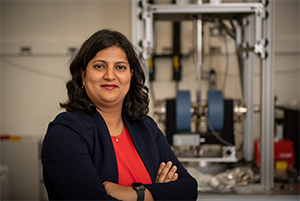Graduate Seminar Series
September 09, 2022
12:20 p.m. ET
Porter Hall - Room 100
September 09, 2022
12:20 p.m. ET
Porter Hall - Room 100
Extreme surface sensitivity of two-dimensional (2D) materials provides an unprecedented opportunity to engineer the physical properties of these materials via changes to their surroundings, including substrate, adsorbates, defects, etc. In addition, 2D materials can be mechanically assembled layer-by-layer to form vertical or lateral heterostructures, making it possible to create novel material properties merely by the choice of the constituting 2D layers. For instance, van der Waals (vdW) heterostructures with a relatively small twist angle between the constituent layers, provide unprecedented ability to create nanoscale perturbations that have shown to exhibit coexisting complex phases of matter including Mott insulating state, superconductivity, bound quasiparticles, and topological states. The advent of the state-of-the-art angle-resolved photoemission spectroscopy with high spatial resolution (micro- and nano- ARPES) and the ability to perform these measurements on fully functional devices, has made it possible to directly probe many exotic physical phenomena in 2D based material systems [1, 2]. In this talk, I will present our work on directly visualizing (without any assumption) the electronic properties in vdW materials utilizing the cutting edge in-operando spatially focused angle-resolved photoemission spectroscopy on nanoscale 2D material-based devices [3,4].
References:
[1] Katoch et. al., Nature Physics 14, 355-359 (2018).
[2] Ulstrup, et. al., Science Advances, Vol. 6, no. 14, eaay6104, (2020).
[3] Muzzio, et. al., Physical review B Rapid Communications 101, 201409(R) (2020).
[4] Jones, et. al., Adv. Mater., 32, 2001656 (2020).
 Jyoti Katoch received her PhD from University of Central Florida and did her postdoc at the Ohio State University, before joining physics department at Carnegie Mellon University in 2018. She is a recipient of Ralph E. Powe Junior Faculty Enhancement Award and Department of Energy early career award in 2019. Her group synthesizes and studies the electronic properties of emergent quantum materials employing in-operando focused photoemission spectroscopy techniques on fully functional devices.
Jyoti Katoch received her PhD from University of Central Florida and did her postdoc at the Ohio State University, before joining physics department at Carnegie Mellon University in 2018. She is a recipient of Ralph E. Powe Junior Faculty Enhancement Award and Department of Energy early career award in 2019. Her group synthesizes and studies the electronic properties of emergent quantum materials employing in-operando focused photoemission spectroscopy techniques on fully functional devices.
July 29 2025
11:00 AM ET
Materials Science and Engineering
Graduate Programs Information Session
Learn more about the master's and doctoral programs in materials science and engineering at CMU.
August 13-15 2025
Materials Science and Engineering
Workshop on Methods for Three-Dimensional Microstructure Studies
The workshop is intended for researchers at all levels and will combine presentations on 3D microstructure science as well as practical presentations on the tools and methods for reconstructing, analyzing and synthesizing.
Scott Hall 5201 (Bosch Sparks Conference Room)